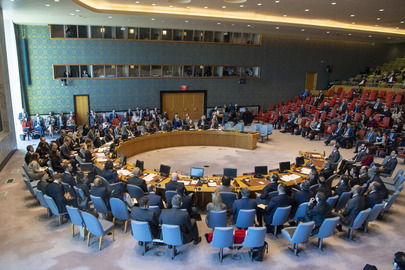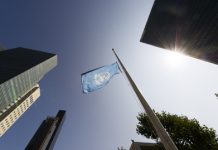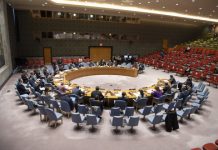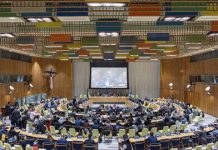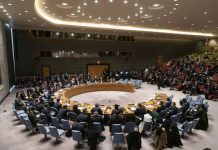As foreign troops suddenly withdrew, life for millions of Afghans, especially women and girls descended into chaos.
“If I had left, a mother or a baby could have died,” Ms. Ahmadi said. “I was worried, but I couldn’t leave because people needed our services. I stayed because people, especially pregnant women, needed my support.”
Clinics shuttered
Public health workers were severely affected by the takeover, as hospitals and clinics were either forced to close or rendered non-functional and their staff could no longer make it to work safely.
Pregnant women were worried about where to deliver as health facilities were closing, Ms. Ahmadi told UNFPA, the United Nations sexual and reproductive health agency that is supporting efforts throughout Afghanistan.
“So, I didn’t close the family health house,” she said.
Seeking skilled healthcare
One of the women who sought help at the Ahangaran clinic was 29-year-old Sughra, who was nine months pregnant.
“A few days earlier, I had gone to the provincial hospital in Bamyan City, but staff told me they weren’t sure whether they would remain open in the following days,” Sughra said.
Uncertain about the availability of skilled care she would find in the city and stressed by the unfolding security situation, she decided to go to her father’s home, as soon as she felt some early, pre-labour contractions.
Humanitarians at work
With her husband and sister-in-law, Sughra endured a three-hour trip in the back of a truck on rough roads to reach her father’s village.
“I was afraid I would give birth on the truck,” she recalled.
A few days later, Sughra started having labour pains and asked to be taken to the family health house, which is supported by UNFPA and is the only available facility in the area.
“We arrived very early in the morning, but my labour lasted throughout the day,” she said.
She delivered a healthy baby boy without any complications at 2pm on 19 August 2021 – on World Humanitarian Day.
“The labour was agonising, but I was happy that we managed everything from the family health house,” Sughra recalled. “If the clinic hadn’t existed during those days, who knows what could have happened to me.”
Mariza Ahmadi has worked as a midwife at the UNFPA-supported Ahangaran family health house in Bamyan Province for four years.
Commitment to her country
Behind the safe delivery is the bravery of the midwife.
“That was a tough situation, but this clinic did not close for a single day during those times,” Ms. Ahmadi said.
“I was also scared, but if I left, all our efforts to prevent maternal and newborn deaths would have gone to waste.”
Against the odds
Afghanistan has long had one of the highest rates of maternal deaths in the world, with one woman dying every hour due to pregnancy and childbirth complications – deaths that could be largely preventable with adequate skilled midwifery care.
Now, as the de facto authorities have drastically reduced women’s ability to work and travel without being accompanied by a male guardian, the situation is only looking more perilous for the women and girls – and future generations – of Afghanistan.
Ms. Ahmadi assisted with three other deliveries that week, serving women who had been displaced from other districts in Bamyan province.
“For the four years I have been working here, there have been no maternal deaths in this clinic.”
Midwifery emergency
Currently funded by the United States and previously by Italy, the Ahangaran family health house provides people living in the surrounding isolated communities with lifesaving health services, despite its location in a remote area of Bamyan province.
Midwives can meet about 90 per cent of the need for essential reproductive, maternal, newborn and adolescent health needs, yet there is a global shortage of some 900,000 trained midwives.
Afghanistan urgently needs an additional 18,000 to meet the demand for skilled birth attendance, a lack that otherwise endangers lives and undermines women’s and girls’ bodily autonomy on a vast scale.
Sughra endured a three-hour trip in the back of a truck on rough roads to reach the village health centre and deliver her baby boy.
Health houses help, one baby at a time
In 2021, UNFPA was supporting just over 70 family health houses in Afghanistan, a figure that – despite the extremely challenging operating environment – has swelled more than sixfold to 477 today.
Since 2021, these clinics have helped more than five million Afghans access critical health services, especially in remote and hard-to-reach areas.
Back at home, Sughra’s son, Farhad, just celebrated his third birthday.
“When he grows up,” Sughra said, “I hope he can study so he can build a good future for himself and other people around him.”
Source of original article: United Nations (news.un.org). Photo credit: UN. The content of this article does not necessarily reflect the views or opinion of Global Diaspora News (www.globaldiasporanews.net).
To submit your press release: (https://www.globaldiasporanews.com/pr).
To advertise on Global Diaspora News: (www.globaldiasporanews.com/ads).
Sign up to Global Diaspora News newsletter (https://www.globaldiasporanews.com/newsletter/) to start receiving updates and opportunities directly in your email inbox for free.


